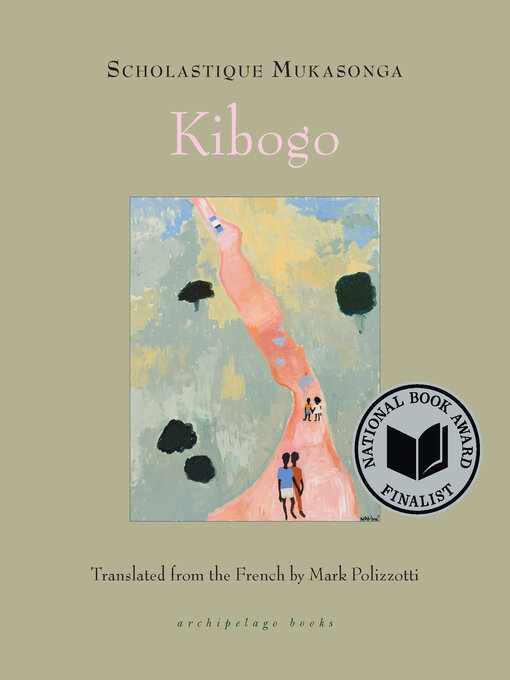- Popular Nonfiction
- Fantastic Fiction
- Just added
- Comics & Graphic Novels & Manga
- See all ebooks collections
A new masterwork of satire, lore, and living memory from the leading voice of French-Rwandan literature
“Mukasonga breathes upon a vanished world and brings it to life in all its sparkling multifariousness” —J.M. Coetzee
In four beautifully woven parts, Mukasonga spins a marvelous recounting of the clash between ancient Rwandan beliefs and the missionaries determined to replace them with European Christianity.
When a rogue priest is defrocked for fusing the gospels with the martyrdom of Kibogo, a fierce clash of cults ensues. Swirling with the heady smell of wet earth and flashes of acerbic humor, Mukasonga brings to life the vital mythologies that imbue the Rwandan spirit. In doing so, she gives us a tale of disarming simplicity and profound universal truth.
Kibogo’s story is reserved for the evening’s end, when women sit around a fire drinking honeyed brew, when just a few are able to stave off sleep. With heads nodding, drifting into the mist of a dream, one faithful storyteller will weave the old legends of the hillside, stories which church missionaries have done everything in their power to expunge.
To some, Kibogo’s tale is founding myth, celestial marvel, magic incantation, bottomless source of hope. To white priests spritzing holy water on shriveled, drought-ridden trees, it looms like red fog over the village: forbidden, satanic, a witchdoctor’s hoax. All debate the twisted roots of this story, but deep down, all secretly wonder – can Kibogo really summon the rain?
-
Creators
-
Publisher
-
Awards
-
Release date
September 13, 2022 -
Formats
-
Kindle Book
-
OverDrive Read
- ISBN: 9781953861375
-
EPUB ebook
- ISBN: 9781953861375
- File size: 1152 KB
-
-
Languages
- English
-
Reviews
-
Publisher's Weekly
July 25, 2022
Mukasonga (Igifu) draws on Rwanda’s colonial history and ancient myths for an intriguing theological satire. In the opener, “Ruzagayura,” set in the aftermath of the 1943 famine, characters variously blame the disaster on Hitler, paganism, and missionaries. After a French priest, referred to only as “padri,” urges villagers to pray for rain, the elders call on their own mythical martyr, Kibogo, a king’s son who sacrificed himself to bring rain. Kibogo’s last priestess, Mukamwezi, lives on the local mountain and agrees to help. But when the rains come, the padri claims the Virgin Mary brought the rain. In “Akayezu,” the Rwandan title character is kicked out of a seminary for heresy after linking the story of Kibogo with that of Jesus and Elijah. In “Mukamwezi,” Akayezu attempts to baptize an old pagan woman, but instead, the two join forces. In the complex and revelatory “Kibogo,” a white professor arrives to record the stories of Kibogo told by two old men of the village. As the men compete in their storytelling, three young men join in, and the professor eventually hears the story he wants them to tell, Mukasonga complicates the blurry line between history and myth and critiques its relationship to colonialism. This speaks volumes to the power of storytelling. -
Kirkus
Starred review from August 1, 2022
A searing tale of contending gods, religions, and economies in colonial Rwanda. As Mukasonga's story opens, a village subchief, bribed by a "Colonial" with "a watch, a pair of sunglasses, a bottle of port wine, two jerry cans of gasoline, [and] a swath of fabric for his wife and daughters," rounds up the children to serve in the war effort against Germany by harvesting anti-malarial flowers. Other agents of change follow: There are the European agronomists who come in to demand that the villagers replace their formerly diverse crops with beans and coffee, then the priests who come in to demand that they give up their "pagan" religious practices in favor of "Yezu." Drought ensues, and with it the people starve, and with that they recall the old ways, when their king would sacrifice himself or one of his family. Kibogo, the legendary son of a king, offers himself up in one such sacrifice, volunteering in a long-ago time to climb a nearby mountain and call down the clouds in the face of sure death. That high country harbors others who are convinced of their magical powers. One is Akayezu, or "Little Jesus," who enters a French seminary only to decide that he has divine powers of his own and, without waiting for ordination, preaches a gospel that "compared Kibogo rising to Heaven to Yezu's ascension, Maria's Assumption, and the abduction of the prophet Elijah on a pikipiki of thunder and flame." Akayezu's evangelization extends to a hermit who herself believes that she has a spirit within that "commands the rain." When the rain does arrive, it comes in punishing torrents and violent thunderstorms that put terror in the hearts of the villagers: "Some jangled rosaries, others gourd rattles, or the bones of warthogs or of their ancestors." It's satisfying to see the colonial experts and intrusive priests get some measure of comeuppance while Kibogo makes his return to bring, finally, more sustaining rains, proving, as Mukasonga's narrator has it, that "Kibogo too can shake the sky and set off the thunder: isn't the tale of Kibogo equal to the tale of Yezu?" Pensive and lyrical; a closely observed story of cultures in collision.COPYRIGHT(2022) Kirkus Reviews, ALL RIGHTS RESERVED.
-
Loading
Why is availability limited?
×Availability can change throughout the month based on the library's budget. You can still place a hold on the title, and your hold will be automatically filled as soon as the title is available again.
The Kindle Book format for this title is not supported on:
×Read-along ebook
×The OverDrive Read format of this ebook has professional narration that plays while you read in your browser. Learn more here.


